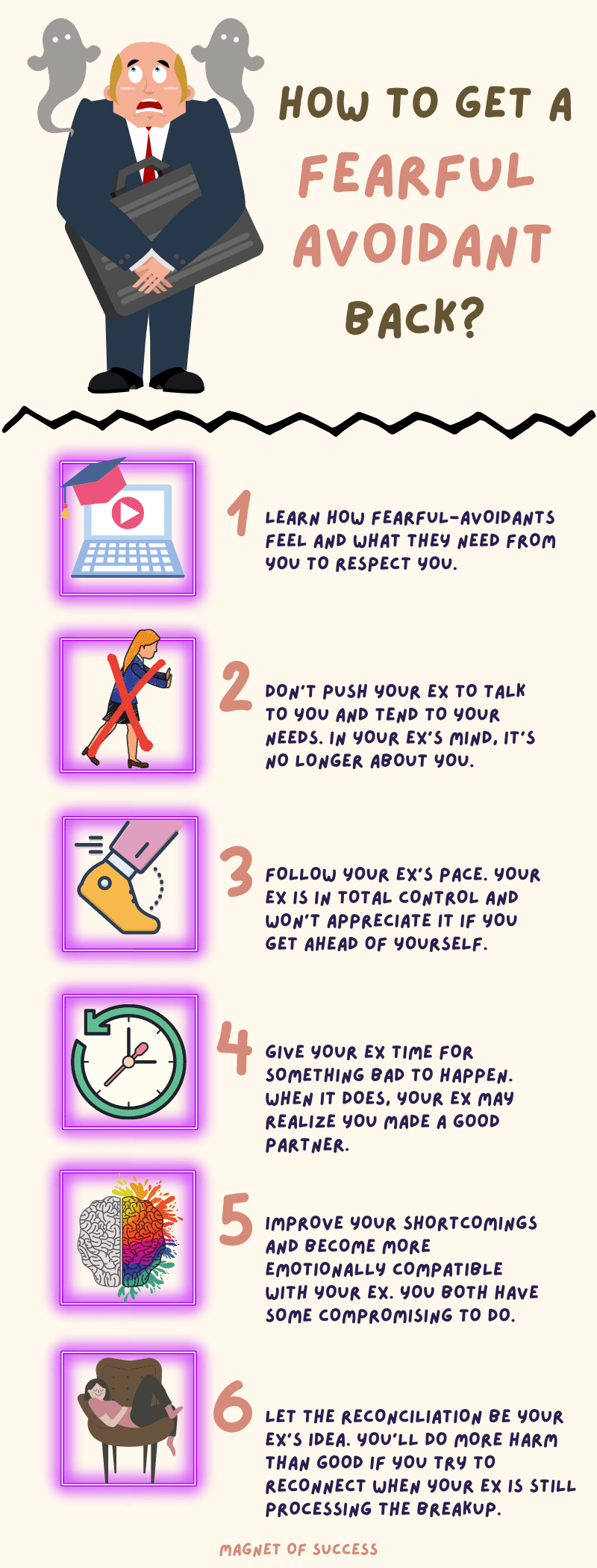A breakup with a fearful avoidant ex can be a tricky experience.
On the one hand, the dumper doesn’t want anything to do with you romantically and appears happy and free. But on the other, he or she wants to keep you around for safety and support—and get what he or she needs from you. The more the dumper relies on you after the breakup, the more he or she confuses you and makes you think that he or she still craves you as a partner and that you may get back together once he or she has dealt with unhealthy avoidant tendencies.
Although some fearful avoidants get help and learn why they fear connections and attachments, the majority of dumpers don’t. Most of them have gone through multiple breakups and lack the urge to invest time, energy, and money in themselves. They prefer to engage in unproductive activities such as hanging out with friends and, as a result, project their unresolved traumas and issues onto their new partners.
Dumpers in general (whether they’re secure, fearful, avoidant, or a mixture of all attachment styles) don’t reflect. They listen to their emotions and consider themselves victims who have the right to escape unhealthy, difficult, stagnant, and unfulfilling relationships. They believe their attachment style (what they feel toward their partner) is an accurate and acceptable tool to judge the quality of their relationship and behavior.
Little do they know that their feelings change, depending on their thoughts and experiences in their current and previous relationships. If they’ve had traumatic experiences with previous partners and haven’t yet dealt with those traumas, they may avoid their partners due to the fear of breaking up. In other words, they could develop trust issues and feel they can’t fully trust anyone but themselves.
This feeling of distrust has nothing to do with their partner. It’s got everything to do with their unprocessed fears and the similarities between the past and the present. Fearful avoidants fear the past and dislike anything and anyone who awakes their traumas and triggers their anxiety, fear, and pain. They’re scared of going through the kinds of experiences they went through with parents or previous romantic partners.
As a result, they avoid fully investing in relationships and people who want the best for them.
Fearful avoidant people lost control over their attachment styles sometime in the past. They decided they weren’t going to trust people with their feelings and that they had to protect themselves. Because they’ve chosen not to take risks, they’ve consciously or subconsciously changed the way they feel or allow themselves to feel in romantic relationships.
They’ve become scared of feeling vulnerable around people.
They typically can’t or don’t want to change their attachment style because they like the feeling of safety. They feel in control of their most sensitive emotions when in reality, they gave up control a long time ago. They gave it up when they let some negative experience change their beliefs and behaviors.
To others, they appear strong but they’re actually extremely insecure and scared of the past repeating itself. They avoid deep, meaningful connections because such connections could hurt them (much like they did in the past). Due to the fear of potential pain, they prefer to play it safe and keep people away from them.
You need to understand that people with trust issues and fearful/avoidant attachment styles aren’t brave people. They have self-protective beliefs that are hardwired into their brains and may need professional help to change. It’s unlikely that they’ll face their fears after leaving their partner. It’s much more likely that they’ll reflect and grow when they get dumped themselves and realize that they lost someone amazing due to their inability to form or maintain deep connections.
So if you broke up with a fearful avoidant ex (and want your ex back), bear in mind that your ex has a lot of work to do. He or she has to find an incentive to engage in reflection. A reflection could help your ex recall his or her traumatic experiences and identify insecurities that control his or her life.
Self-awareness is the first step. Once your ex understands that he or she isn’t as innocent as he or she thinks, your ex must either seek professional help or spend a lot of time thinking about his or her relationship-damaging behavior. Not only must your ex think about you, but your ex must also want to do better next time. Your ex must strive to be a better partner and have a deeper romantic relationship.
Without a desire to change and improve, your fearful avoidant ex won’t come back. Your ex will most likely continue to be guided by unhealthy emotions and play the blame game. He or she will justify bad behaviors by thinking or saying that he or she felt unwanted emotions because of you and that he or she had no choice but to end the relationship.
No matter how badly you want your ex to understand where his or her fearful-avoidant tendencies come from, you mustn’t try to do the work for your ex. Your ex has to find a motive and desire to change on his or her own. If you send your ex links to self-help books and articles and try to motivate your ex to stop being fearful-avoidant, your ex will likely tell you to mind your own business and advise you to work on yourself instead.
Your wish to help (which your ex will perceive as meddling) will make your ex angry and lower his or her desire or need to change anything about his or her life.
You see, when a dumper feels angry (an emotion of power and control), the dumper doesn’t feel motivated to evolve. He or she feels powerful and is satisfied with the way he or she is.
The dumper has to first lose power to want to get rid of unhealthy beliefs and behaviors. And the dumper can do that by encountering something difficult or painful that leaves him or her with no choice but to grow.
So give up on trying to change your fearful avoidant ex into the person you want him or her to be. Your ex will change only if he or she becomes unhappy, realizes his/her mistakes, and wants to have healthier relationships.
In this post, we’ll discuss how to navigate a breakup with a fearful avoidant ex and how to get a fearful avoidant ex back.

What does a fearful avoidant ex want after a breakup?
Like any ex, a fearful avoidant ex wants space and time. He or she wants to stay busy and hang out with people who don’t pressure and suffocate him or her. Such people empower and relax your ex and make your ex feel happy emotions.
Unfortunately, you still have expectations of your ex, so you’re not one of those people. You’re an ex whom he or she associates stress, pain, and other undesirable emotions with. As long as your presence or behaviors bring out repressed thoughts and feelings, your ex doesn’t want to be anywhere near you. He or she doesn’t even want to text or call.
Fearful avoidant or not, your ex reached the boiling point and needs to cool off. He or she doesn’t want to be bothered with your problems, feelings, desires, and expectations. Such matters no longer concern your ex. If they did, your ex wouldn’t have abandoned the relationship and left you to fend for yourself.
Your ex would have found a way to fix the parts of the relationship that needed fixing and stayed committed.
The main difference between a fearful avoidant ex and a regular ex is that a fearful avoidant ex may occasionally get scared of being left behind. If you’re doing no contact successfully (focusing on yourself, avoiding breakup mistakes, and moving on with your life, your ex may fear that you’ve forgotten about him or her and found someone better to replace him or her with.
A fearful avoidant is an insecure individual, remember? His or her insecurities could kick in and force him or her to obtain your reassurance. This is the most likely to happen when life gives him or her lemons and triggers unprocessed fears.
Your ex could basically reach out for emotional support and confuse you. He or she could make it seem like the breakup was a bad decision and that it may be possible to reconcile.
You need to be careful so you don’t get your hopes up and strung along. Hope will make you anxious for months or years, depending on what you do and how you handle your ex’s breadcrumbs.
So bear in mind that your fearful avoidant ex could have moments of weakness when he or she reaches out and checks up on you. He or she may not want you back, but your ex could appear nostalgic, guilty, or anxious and want to converse for a while. Your ex could also ask you if you’re seeing someone and if you’re happy.
If that happens, don’t immediately assume that your ex wants you back. Remember that your ex could just be curious about you and want to chat. Small talk wouldn’t hurt your ex unless it turns into a conversation about unmet needs and expectations.
An avoidant ex could desire various things from you, depending on his or her problems, wants, and needs. It’d be wise to expect a reach out when your ex wants or needs something he or she can’t get from anyone else.
You may notice your ex keeping a distance from you one day and seeking your attention and validation the next. As confusing as that may be, remember that hot and cold behavior is common for fearful-avoidant ex-partners. Fearful avoidants often want love and commitment but are afraid of it. They fear they’ll get broken up with and suffer the way they did in the past.
All fearful avoidants need to breadcrumb and confuse you is to process negative breakup emotions, respect you, and have unmet wants or needs. When they value you and want or need to talk to you, they’ll reach out and test the waters. They’ll want to know how you’re coping with the breakup and how you feel about them.
If you want them in your life as a friend, they could friend-zone you and keep you at a reasonable distance.
If they don’t want you near them, however, and sense that you want more than they do, they’ll likely ask you to respect their boundaries and give them space. It all depends on their personality and what you ask of them.
With that said, here’s what a fearful avoidant ex could want from you.

How to handle a fearful avoidant ex?
A fearful avoidant ex may have unresolved issues, but he or she is still an ex. The fearful-avoidant should not be treated any differently just because he or she has fearful-avoidant tendencies. Yes, a fearful avoidant person is more emotion-driven and unpredictable compared to a secure ex, but overall, your post-breakup strategy remains the same.
You still have to go no contact with your ex and let your ex be in full control of the breakup. Don’t contact your ex when you get anxious and want to talk. Don’t entertain your ex’s breadcrumbs either. Simply follow the rules of no contact and let your fearful avoidant ex come to you.
Whether your ex is secure, fearful, avoidant, or fearful-avoidant, your ex needs to be free for a while and get used to living without you. It’s what your ex asked for when he or she broke up with you, so it’s what your ex must get now that he or she is single or with someone else. He or she can’t continue to reach out and engage in conversations as if the breakup never happened.
If your ex is afraid to let you go and live without you, that’s not your problem. It’s your ex’s problem for not valuing you romantically and resolving his or her insecurities. Likewise, if your ex is avoidant and doesn’t want to get back with you, it’s not your job to convince your ex to give the relationship another chance.
Your ex must see your worth without your intervention so that your ex can stay committed to you if he or she decides to come back.
Below is an infographic with 6 tips on how to get a fearful avoidant back.

If you don’t want your ex back, that’s okay too. Bear in mind that your ex could occasionally contact you and talk about things that confuse you. You should avoid talking to your ex by letting your ex know you want space and that you’re not ready for friendship.
Don’t think that you owe your ex friendship and unlimited replies. Regardless of your ex’s attachment style, you must take the breakup seriously and treat it as the end of the relationship. The end of the relationship means the end of everything that connects you to your ex. You may be able to befriend your ex later when you’re over the breakup.
For now, create some distance and focus on healing. Your ex will probably do the same. If he or she doesn’t, you know what to do. Avoid your ex’s breadcrumbs by asking for space right away.
Remember that you’ve broken up and that you shouldn’t stay in touch. You should both figure out what to do with negative post-breakup emotions and temptations to reach out. Once you’ve regained control, you’ll have an easier time focusing on yourselves and moving on.
Did you get dumped by a fearful avoidant ex and don’t know how to handle your ex? Let us know your post-breakup difficulties in the comments section below. It may help others going through similar situations.
However, if you want our help with your fearful avoidant ex-boyfriend or ex-girlfriend, feel free to contact us here.
My name is Zan and I’m the founder of Magnet of Success. I enjoy writing realistic relationship and breakup articles and helping readers heal and grow. With more than 5 years of experience in the self-improvement, relationship, and breakup sphere, my goal is to provide advice that fosters positivity and success and avoids preventable mistakes and pain. Buy me a coffee, learn more about me, or get in touch today.



Such an exciting article!
I have read it and saved it for later whenever I have a similar experience or friends around me
Thanks for reading and saving the post, Linda.
Best regards,
Zan
My pet peeve when my ex claim he want to be friends yet never follow through. I wish him nothing but the best.